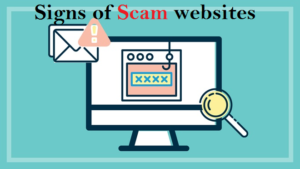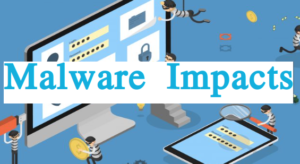Don’t Fall Victim to The Central Bank Of Nigeria Email Scam
The “Central Bank Of Nigeria Email Scam” is a tricky scheme to steal your personal and financial information. In this scam, you receive an email that claims to be from the Central Bank of Nigeria. They tell you a story about how they’re restructuring their financial system, and somehow, you’re eligible to receive millions of dollars.
The email sounds convincing and says they want to transfer 6.4 million USD to your bank account. But here’s the catch: they ask you to provide your banking information to make the transfer happen.
But wait, it’s all a big lie! This email is not from the real Central Bank of Nigeria or any other legitimate organization. It’s a scam to get your sensitive information.
If you fall for it and give them your banking details, these scammers can do a lot of harm. They might steal your money, make unauthorized purchases, or even trick you into sending them more money.
Sometimes, these scams go even further. They might ask you to make a small payment to cover fees or taxes before they release your supposed millions. If you do, you’ll end up losing that money too.
So, if you receive such an email:
- Don’t believe it: These promises of easy money are usually too good to be true.
- Don’t share your banking info: Never give out your bank account details to anyone you don’t trust completely.
- Ignore the email: Delete it and don’t respond to it.
- Stay cautious: Be careful online and remember that scammers often use official-sounding names to deceive people.
If you’ve already shared your account details, change your passwords right away and contact your bank to let them know. If you’ve shared other personal information, like your credit card or ID details, report it to the authorities immediately.
Scammers are always trying to trick people, so it’s essential to be cautious and protect your personal information. Remember, if something seems too good to be true, it probably is!
Message In The Spam Letter:
Subject: INFORMATION CIRCULAR.
Dear Fund Beneficiary,
We have noticed with deep concern the fraudulent and corrupt practices by some officials of the Nigerian financial institutions and government agencies formerly designated with the duty to process and perform the remittances of various foreign contract/inheritance payments. These nefarious activities have put Nigeria in bad light among the committee of nations, which have been very inimical to her economic growth and development. It is a fact that some beneficiaries while trying to realize their legitimate contract/inheritance payments have unsuspectingly fallen prey to schemes and grand designs of these bad elements in Nigeria who create artificial impediments in the processing of foreign contract/inheritance payments as devices to perpetrate fraud.
In need to restore and re-position the ailing Nigerian economy and status for improved direct foreign investments and economic growth, the United Nations Economic Commission for Africa (UN/ECA) was prevailed upon by the president of Nigeria to wade into the matter in partnership with the Nigerian government to grapple with the arduous task of restructuring for advancement the Nigerian economic and financial status, and to further effectiveness in foreign payment resolution.
In the course of verification of your payment file, it was discovered that you have satisfactorily completed all required legal and financial obligations in respect of your payment. In this vein, your fund has been ratified for immediate payment, and high power directives have been issued to newly restructured Central Bank of Nigeria to credit your bank account without further delay with the total sum of US$6,400,000.00 representing part payment of your outstanding fund, who under the present structure have taken over full responsibility on all outstanding foreign debts/payments.
You are hereby advised to contact and communicate your bank account information to the Managing Director, Payment System Directorate, Central Bank of Nigeria – CBN for crediting of US$6,400,000.00 into your bank account. While communicating the the Managing Director, Payments System Directorate – CBN, please quote: Ref No: UN-ECA/INHERITANCE-CONTRACT/#0170717 for his reference.
The contact information of the Managing Director, Payments System Directorate – CBN is:
Contact Person: DR. SILAS JAYAMMA (Managing Director, Wire Transfer Services – CBN)
Bank Address: Central Bank of Nigeria, Plot 33, Abubakar Tafawa Balewa Way, Abuja, Nigeria
Office Telephone No: +234 9 2900062
E-mail Address: [email protected]
Yours truly,
Ms. Ngone Diop
(Director, Subregional Office, West Africa)
UN Economic Commission for Africa
7, Alfred Rewane Street, Ikoyi, Lagos, Nigeria
Hotline: +234 7040700001
In terms of email-based cyber threats, what are the different types of malicious emails?
Emails having Malicious Attachments
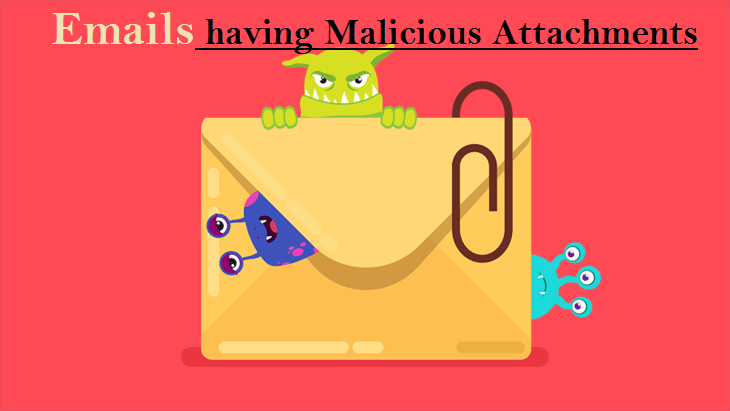
Email spam containing malicious attachments is a commonly employed method by cybercriminals to compromise users’ computers with malware. Malicious attachments often harbor trojans that possess the ability to pilfer sensitive data such as banking details, passwords, and other confidential information.
The primary objective of cybercriminals in these attacks is to deceive their potential victims into accessing a compromised email attachment. They commonly employ email messages that discuss recently obtained invoices, faxes, or voice messages to accomplish this aim.
If an unsuspecting individual succumbs to the trap and opens the attachment, their computer becomes infected, allowing cybercriminals to gather a substantial amount of confidential data.
Although it is a more intricate technique to pilfer personal data (as spam filters and antivirus programs typically identify such endeavors), if cybercriminals achieve success, they can access a broader spectrum of information and continue accumulating data over an extended duration.
Phishing Emails

Typically, cybercriminals employ deceitful emails to deceive individuals on the internet into divulging their confidential personal information, such as login credentials for diverse online platforms, email accounts, or online banking details.
These types of attacks are commonly known as phishing. In a phishing attack, cybercriminals typically send an email that mimics the branding of popular services like Microsoft, Amazon, DHL, or Netflix. They craft messages with a sense of urgency, such as incorrect shipping details or expired passwords, and include a hyperlink, hoping to entice unsuspecting recipients into clicking on it.
Upon clicking the provided link in these email messages, victims are redirected to a counterfeit website that closely resembles the legitimate one. In this deceptive environment, victims are prompted to enter their password, credit card information, or other sensitive data, which is subsequently harvested by cybercriminals for malicious purposes.
Spam Emails

Spam emails are unsolicited, bulk messages sent to a large number of recipients simultaneously. They often contain unwanted advertisements, scams, or fraudulent offers. The primary purpose of spam emails is to promote products, services, or websites, sometimes of dubious nature.
These emails can be sent by individuals or automated bots, and they often target a wide range of recipients without their consent. Spam emails can clog up inboxes, consume storage space, and pose risks such as phishing attempts or malware distribution.
Sextortion Emails
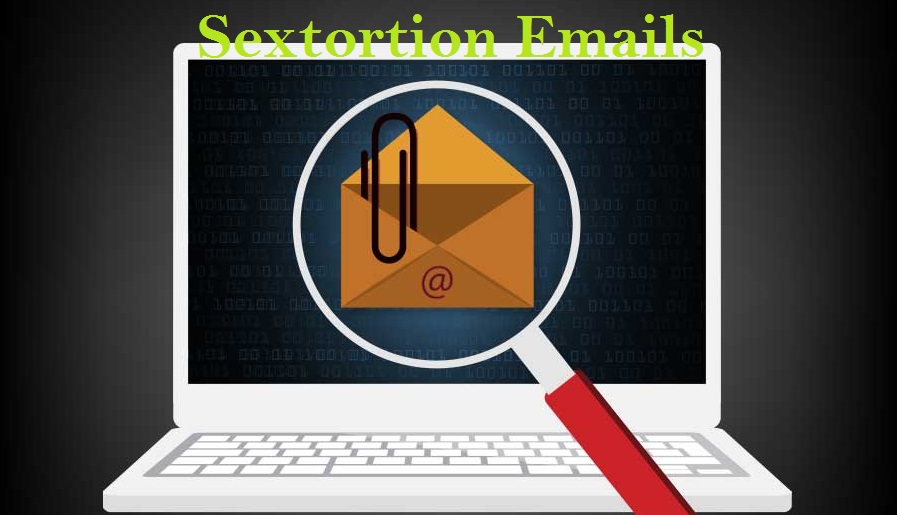
This type of email is a form of phishing known as a “sextortion scam.” It preys on individuals’ fears and attempts to blackmail them into paying a ransom. The scam email falsely claims that a cybercriminal has gained unauthorized access to the victim’s webcam and possesses a compromising video recording of them engaging in explicit activities.
The scammers leverage the potential embarrassment and shame associated with such content to coerce the victim into paying a ransom, often in the form of cryptocurrency, to prevent the release of the alleged video. However, it is crucial to understand that these claims are entirely false and fabricated.
What are some indicators or signs that can help identify a malicious email?
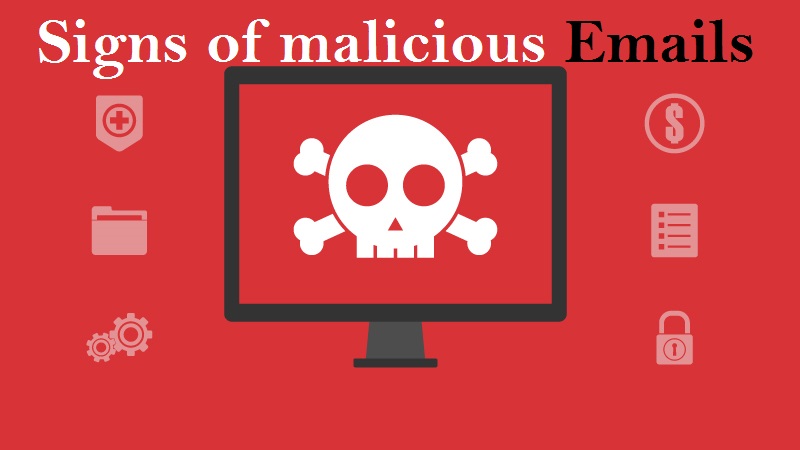
To spot a malicious email you can look for the following indicators:
Suspicious Sender: Check the sender’s email address and verify if it matches the official contact information of the organization or person they claim to represent. Be cautious of email addresses that contain misspellings, random numbers, or unfamiliar domain names.
- Poorly Written Content: Pay attention to grammar and spelling mistakes, unusual language, or poor formatting. Legitimate organizations usually maintain professional communication standards.
- Urgent or Threatening Language: Beware of emails that create a sense of urgency, pressure you to take immediate action, or threaten negative consequences if you don’t comply. Scammers often use fear or time-sensitive situations to manipulate victims.
- Suspicious Attachments or Links: Be careful of email attachments or links, especially from unknown or unexpected sources. Don’t open attachments or click on links unless you are confident about their legitimacy. Hover over links to see the actual URL before clicking.
- Requests for Personal Information: Legitimate organizations typically don’t request senstive information, such as passwords, Social Security numbers, or credit card details, via email. Avoid providing personal data unless you are certain of the email’s authenticity.
- Unusual Requests or Offers: Be wary of emails offering unexpected rewards, prizes, or financial opportunities. If something seems too good to be true or doesn’t align with your normal interactions, it could be a sign of a scam.
- Suspicious Email Design: Poorly designed or visually inconsistent emails may indicate a scam. Watch for generic greetings, mismatched logos, or distorted images.
If you have doubts about an email’s legitimacy, it’s best to err on the side of caution. Avoid clicking on links or downloading attachments, and consider contacting the sender through a verified channel to verify the email’s authenticity.
What actions can be taken if you have fallen for an email scam?
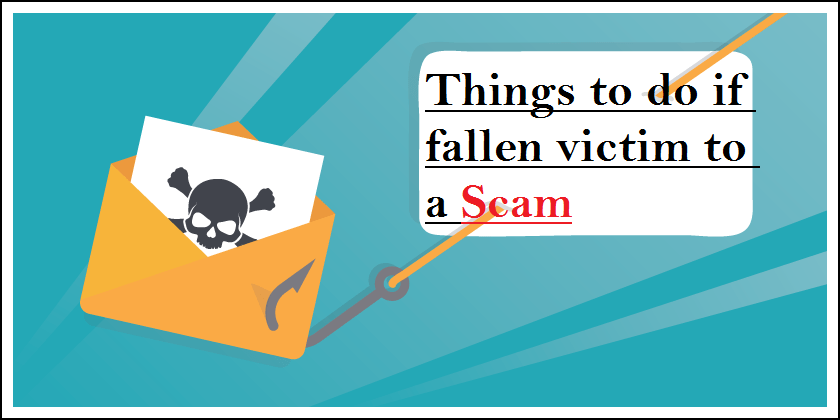
Below are the steps you should take if you’ve fallen prey to the Central Bank Of Nigeria Email Scam.
- If you have mistakenly provided your credit card information after clicking on a link in a phishing email, it is crucial to immediately contact your bank and inform them about the situation. It is highly likely that you will need to take steps to cancel the compromised credit card and request a replacement for enhanced security.
- If you have inadvertently provided your password after falling for an email scam, it is essential to promptly change your password. Typically, cybercriminals gather stolen login details and sell them to other malicious groups for potential exploitation. By changing your password immediately, you reduce the likelihood of criminals having sufficient time to cause harm or unauthorized access to your accounts and information.
- If you notice any indications of identity theft, it is important to promptly reach out to the Federal Trade Commission (FTC). The FTC will gather information about your situation and develop a personalized recovery strategy.
- Assist in safeguarding fellow internet users by reporting phishing emails to organizations such as the National Fraud Information Center, Anti-Phishing Working Group, FBI’s Internet Crime Complaint Center, and the U.S. Department of Justice.
- If you have inadvertently opened a malicious attachment, it is likely that your computer has been compromised. To address this, it is advised to conduct a thorough scan of your system using a reliable antivirus software. We suggest utilizing SpyHunter 5 for Windows to help mitigate any potential threats.
⇓⇓Download Spyhunter 5 Free Scanner⇓⇓
Do make sure to read SpyHunter’s EULA and Privacy Policy. Spyhunter free scanner downloaded just scans and detect present threats from computers and can remove them as well once, however it requires you to wait for next 48 hours. If you intend to remove detected threats instantly, then you will have to buy its licenses version that will activate the software fully.
Frequently Asked Questions
Why was I included in the distribution of this email?
Phishing emails are often disseminated by threat actors through extensive campaigns, leading to thousands of recipients receiving comparable messages.
If I have viewed a spam email but refrained from opening the attachment, is there a possibility that my computer has been infected with malware?
Simply opening or reading an email does not pose a direct risk of malware infection. The actual threat arises when you interact with malicious attachments or links contained within the email, triggering potential malware download or installation processes.
If I downloaded and opened a file from a spam email, does that mean my computer is infected?
If the file you opened from a spam email was an executable file (.exe, .run, etc.), there is a high chance that your computer may be infected. However, if the file was a document format (.doc, .xls, .one, .pdf, etc.), the risk of infection may be lower as these formats usually require additional actions to initiate the download or installation of malware, such as enabling macros or clicking on embedded content.
If I have unknowingly shared your personal information in response to a deceptive spam email, what steps should I take to mitigate the potential risks?
If you have mistakenly shared your login credentials, it is crucial to change the passwords for all affected accounts promptly. Additionally, if sensitive personal information like identification documents or credit card details were disclosed, it is important to promptly notify the relevant authorities or organizations responsible for handling such incidents.
Is SpyHunter 5 capable of detecting and eliminating malware infections that may be present in email attachments?
SpyHunter 5 is powerful security software that is specifically designed to scan devices and effectively remove various types of malware infections. With its comprehensive scanning capabilities, it can detect and eliminate most known malware threats, including those that may be present in email attachments and pop-up notifications. Running a thorough system scan is crucial to ensure that all potential threats are identified and removed from your device.

